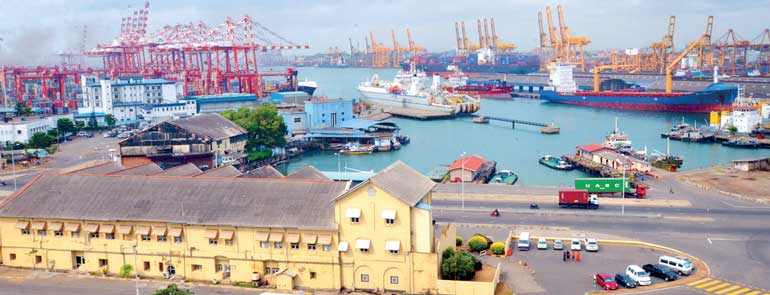Wednesday Feb 18, 2026
Wednesday Feb 18, 2026
Thursday, 20 July 2017 00:00 - - {{hitsCtrl.values.hits}}
 The Port of Colombo has 80% of its volume throughput from transhipment containers and therefore these changes make Colombo vulnerable, especially since these mega alliances control 70% of the business – Pic by Shehan Gunasekara
The Port of Colombo has 80% of its volume throughput from transhipment containers and therefore these changes make Colombo vulnerable, especially since these mega alliances control 70% of the business – Pic by Shehan Gunasekara
By A Special Correspondent
As widely reported in media this week, China’s COSCO Shipping has offered to buy Orient Overseas International (OOIL) for about HK$49 billion ($6.3 billion). If the deal goes ahead, COSCO will obtain OOIL subsidiary OOCL and displace CMA CGM to become the world’s third largest container liner after Maersk and MSC. The deal is subject to anti-trust reviews by Chinese and US Government authorities.
COSCO will end up with a fleet of more than 400 vessels and capacity exceeding 2.9 million TEUs.
Both companies are part of the Ocean Alliance partnership, which also includes CMA CGM and Evergreen Marine. A growing number of container shipping company mergers has left the top six shipping lines controlling 63% of the market. (The Maritime Executive 2017-07-09)
This comes in the backdrop of global consolidation activities of shipping lines during the period 2016/17 driven by over capacity, carried forward operation losses which will eventually result in only 11 global lines surviving down from 20.
Further the remaining ocean carriers have also formed major operational alliances (2M, Ocean Alliance, The Alliance) and this means consolidation of ports of call and services, joint negotiations, and therefore pressure on terminals. The impact of this shake up means that some ports win and some lose.
According to a recent article published in (loadstar) reshuffle in the Asia-Europe trade by The Alliance and Ocean Alliance turns out to be very positive for the port of Singapore, which will receive five more weekly calls. This is largely at the expense of Port Klang, which will see its weekly Europe-Far East calls more than halved,
Including the 2M+HMM alliance, Singapore will receive 34 weekly calls from the 29 Asia-Europe loops offered by the three alliances, compared with its current 29 calls from 27 services.
Port Klang will see its number of weekly calls reduced from 11 to only 5. According to Alphaliner, this is largely due to the purchase of Singapore-based APL by CMA CGM. Hong Kong will receive seven weekly calls of North European loops and three weekly calls of Mediterranean loops, down from 10 and five calls respectively The Port of Colombo has 80% of its volume throughput from transshipment containers and therefore these changes make Colombo vulnerable, especially since these mega alliances control 70% of the business.
Current domestic import and export volumes handled in the port of Colombo is not sufficient to sustain the port infrastructure and a shift in volumes similar to Port Klang will be extremely painful for Sri Lanka to handle , with infrastructure being left unutilised and delays to new projects – East Container Terminal (ECT). On the other hand, developments in India’s port sector is worth taking note. Adani Ports and Special Economic Zone (APSEZ) has commenced construction work at India’s first dedicated transshipment port, in Vizhinjam, Kerala. The new container port will have a deep draft of 20.5m and the first phase of the berths being built will be 800m in length. The transshipment facility is expected to be operational within four years.
The aim is to attract to India some of the transshipment traffic currently handled through overseas ports, including Colombo in Sri Lanka. The port of Vizhinjam is located close to main shipping lanes .This could pose a grave threat to Colombo given more than 75% of the transhipment volume handled is Indian cargo. It is clear that today all major carriers and mega vessels are calling at the Port of Colombo owing to the development of deep draft facilities in the south harbour and the fact that no other port in South Asia has these facilities.
From a national perspective it is imperative to keep these carriers calls in Colombo and to do so we recommend that the Government of Sri Lanka keep track of the developments in the industry and engage with major shipping lines and industry bodies like CASA to understand their requirements for future growth. Today all major shipping lines are already in Sri Lanka and we suggest that the concerns of these existing businesses to be addressed.
Some of the key concerns raised previously include ensuring efficiency in the Port of Colombo for marine and terminal handling and reduce delays in arrival and departure of ships. Develop business-friendly legislative frameworks which are in line with international practices. In particular the legislation regarding all inclusive freight Gazette Extraordinary No 1842/16, passed in 2013, that impacts carriers’ abilities to assess surcharges for cost recovery on local exports and imports.
Improve ease of business and focus on development of Sri Lankan exports – which will ensure that the carriers keep their interests in calling at the Port of Colombo for volumes.